- Home
- neetha Napew
Aztec
Aztec Read online
You tell me then that I must perish
like the flowers that I cherish.
Nothing remaining of my name,
nothing remembered of my fame?
But the gardens I planted still are young—
the songs I sang will still be sung!
HUEXOTZIN, Prince of Texcóco, ca. 1484
COURT OF CASTILE VALLADOLID
To His Majesty's legate and chaplain, Fray Don Juan de Zumárraga, lately appointed Bishop of the See of Mexíco in New Spain, a charge upon him:
That we may be better acquainted with our colony of New Spain, of its peculiarities, its riches, the people who possessed it, and the beliefs, rites, and ceremonies which they heretofore held, we wish to be informed of all matters appertaining to the Indians during their existence in that land before the coming of our liberating forces, ambassadors, evangels, and colonizers.
Therefore, we order that you shall inform yourself from ancient Indians (having first administered to them the oath, to assure veracity) as to their country's history, their governments, their traditions, their customs, etc. In addition to the information that you secure from witnesses, you will cause to be brought before you any writings, tablets, or other records of that foregone time which may substantiate what is said, and you will cause your missionary friars to search and ask for such records among the Indians.
Because this is a very weighty matter and very necessary for the discharge of His Majesty's conscience, we command you to attend to the conduct of the said inquiry with all possible promptitude, care, and diligence, and that your account be set forth in much detail.
(ecce signum) CAROLUS R I
Rex et Imperator
Hispaniae Carolus Primus
Sacri Romani Imperi Carolus Quintus
I H S
S.C.C.M.
Sanctified, Caesarean, Catholic Majesty, the Emperor Don Carlos, Our Lord King:
May the grace, peace, and loving kindness of Our Lord Jesus Christ be with Your Majesty Don Carlos, by divine mercy eternally august Emperor; and with your esteemed Queen Mother Doña Juana, together with Your Majesty by the grace of God rulers of Castile, of Leon, of Aragon, of the Two Sicilies, of Jerusalem, of Navarre, of Granada, of Toledo, of Valencia, of Galicia, of Mallorca, of Seville, of Sardinia, of Cordova, of Corcega, of Murcia, of Jaen, of the Caribbees, of Algeciras, of Gibraltar, of the Canary Isles, of the Indies, of the islands and lands of the Ocean Sea; Counts of Flanders and of the Tyrol, etc.
Very Fortunate and Most Excellent Prince: from this city of Tenochtítlan-Mexíco, capital of your dominion of New Spain, this twelfth day after the Assumption, in the Year of Our Lord one thousand five hundred twenty and nine, greeting.
It was but eighteen months ago, Your Majesty, when we, though the least of your vassal subjects, heeded Your Majesty's command that we assume this trifold post as the first appointed Bishop of Mexíco, Protector of the Indians, and Apostolic Inquisitor, all embodied in our one and own poor person. It has been but nine months since our arrival in this New World, and there was much arduous work awaiting us.
In accordance with the mandate of this appointment, we have striven zealously "to instruct the Indians in their duty to hold and worship One True God, Who is in Heaven, by Whom all creatures live and are maintained"—and likewise "to acquaint the Indians of that Most Invincible and Catholic Majesty, the Emperor Don Carlos, whom divine Providence has willed that the whole world should obey and serve."
Inculcating these lessons, Sire, has been far from easy or expeditious. There is a saying among our fellow Spaniards here, extant well before our arrival: "The Indians cannot hear except through their buttocks." But we try to bear in mind that these miserable and spiritually impoverished Indians—or Aztecs, as most Spaniards now refer to this particular tribe or nation of them hereabouts—are inferior to all the rest of mankind, and therefore, in their insignificance, deserve our tolerant indulgence.
Besides attending to the Indians' instruction—that there is only One God in Heaven, and the Emperor on earth, who's subjects they have all become and whom they must serve—and besides dealing with many other ecclesiastical and civil matters, we have attempted to comply with Your Majesty's personal adjuration to us: that we early prepare an account of the conditions of this terra paena-incognita, the manners and ways of life of its inhabitants, the customs, etc. formerly obtaining in this benighted land.
Your Most Lofty Majesty's royal cédula specifies that we, in providing the chronicle, shall inform ourself "from ancient" Indians." This has necessitated something of a search, inasmuch as the total destruction of this city by Captain-General Hernán Cortés left us very few ancient Indians from whom thy seek a credible oral history. Even the workers currently re-building the city consist mainly of women, children, the dolts and dotards who were unfit to fight in the siege, brute peasants conscripted from the outlying lands. Oafs, all of them.
Nevertheless, we were able to ferret out one ancient Indian (of some sixty and three years of age) capable of providing the desired account. This Mexícatl—he repudiates both the appellations Aztec and Indian—is of a high grade of intelligence (for his race), is articulate, is possessed of what education was heretofore afforded in these parts, and has been in his time a scrivener of what passes for writing among these people.
In his lifetime he has had numerous occupations besides that of scribe: as warrior, as courtier, as traveling merchant, even as a sort of emissary from the late rulers of this place to the first arriving Castilian liberators, and those envoy duties have given him a passable grasp of our language. Though his Castilian falters seldom, we of course desire precision in all details. So we have provided an interpreter, a young lad who has considerable proficiency in Náhuatl (which is what these Aztecs call their guttural language of lengthy and unlovely words). In the interrogation room, we have also seated four of our own scribes. These friars are adept in that art of swift writing by character, known as Tironian notes, which is employed at Rome for making memoranda of the Holy Father's every utterance, and even for recording the entire proceedings of many-peopled conferences.
We bade the Aztec sit down and tell us his life story. The four friars, busily flicking away at their Tironian squiggles, did not then or since lose a single word that drops from the Indian's lips. Drops? Better say: words that cascade in torrents alternately loathly and corrosive. You will soon see what we mean, Sire. From the very first opening of his mouth, the Aztec evinces disrespect for our person, our cloth, and our office as our Revered Majesty's personally chosen missionary, which disrespect is an implicit insult to our sovereign himself.
The first pages of the Indian's narrative follow immediately after this explanatory introduction. Sealed for your eyes only, Sire, this package of manuscript will depart Tezuítlan de la Vera Cruz the day after tomorrow in the keeping of Captain Sanchez Santovena, master of the caravel Gloria.
Your Caesarean Majesty's wisdom, sagacity, and discrimination being universally known, we realize that we risk your imperial displeasure in presuming to preface the enclosed pages with a caveat, but, in our episcopal and apostolic capacity, we feel that obligatory upon us. We are sincerely desirous of Complying with Your Majesty's cédula, of sending a true report of all there is worth knowing of this land. But others besides ourself will tell Your Majesty that the Indians are paltry beings, in whom one will scarcely find even vestiges of humanity; who do not even have a comprehensible written language; who have never had any written laws, but only barbaric customs and traditions; who have been or still are addicted to all kinds of intemperance, paganism, ferocity, and carnal lusts; who have but lately tortured and slain their own fellow beings for the sake of their misbegotten "religion."
We cannot believe that a worthwhile or edifying report can b
e procured from an informant like this arrogant Aztec, or from any other native, however articulate. Also, we cannot believe that our Sanctified Emperor Don Carlos can be other than scandalized by the iniquitous, salacious, and impious prattlings of this overweening specimen of a dunghill race. We have referred to the enclosure herewith as the first part of the Indian's chronicle. We fervently desire and trust that it will also, by Your Majesty's command, be the last.
May God Our Lord guard and preserve the precious life, the very royal person, and the very catholic estate of Your Majesty for uncounted years, with the enlargement of your reigns and dominions as your royal heart desires.
Of Your S.C.C.M., the ever faithful servant and chaplain,
(ecce signum) Fr. Juan de Zumárraga
Bishop of Mexíco
Apostolic Inquisitor
Protector of the Indians
INCIPIT:
The chronicle told by an elderly male Indian of the tribe commonly called Aztec, which narrative is addressed to His Excellency, the Most Reverend Juan de Zumárraga, Bishop of Mexíco, and recorded verbatim ab origine by
FR. CASPAR DE GAYANA J.
PR. TORIBIO VEGA DE ARANJUEZ
FR. JERONIMO MUÑOZ G.
FR. DOMINGO VILLEGAS E YBARRA
ALONSO DE MOLINA, interpres
DIXIT:
My Lord—
Pardon me, my lord, that I do not know your formal and fitting honorific, but I trust I do not hazard my lord's taking offense. You are a man, and not one man of all the men I have met in my life has ever resented being addressed as a lord. So, my lord—
Your Excellency, is it?
Ayyo, even more illustrious—what we of these lands would call an ahuaquahuitl, a tree of great shade. Your Excellency it shall be, then. It impresses me the more that a personage of such eminent excellency should have summoned such a one as myself to speak words in Your Excellency's presence.
Ah, no, Your Excellency, do not demur if I appear to flatter Your Excellency. Common report throughout the city, and these your servitors here, have made plain to me how august a man you are, Your Excellency, while I am but a threadbare rag, a frayed raveling of what once was. Your Excellency is attired and arrayed and assured in your conspicuous excellency, and I am only I.
But Your Excellency wishes to hear of what I was. This has also been explained to me. Your Excellency desires to learn what my people, this land, our lives were like in the years, in the sheaves of years before it pleased Your Excellency's king and his crossbearers and crossbowmen to deliver us from our bondage of barbarism.
That is correct? Then Your Excellency asks no easy thing of me. How, in this little room, out of my little intellect, in the little time the gods—the Lord God—may have vouchsafed me to finish my roads and my days, how can I evoke the vastness of what was our world, the variety of its peoples, the events of the sheaves upon sheaves of years?
Think, imagine, picture yourself, Your Excellency, as that tree of great shade. See in your mind its immensity, its mighty boughs and the birds among them, the lush foliage, the sunlight upon it, the coolness it casts upon a house, a family, the girl and boy who were my sister and myself. Could Your Excellency compress that tree of great shade back into the acorn which Your Excellency's father once thrust between your mother's legs?
Yya ayya, I have displeased Your Excellency and dismayed your scribes. Forgive me, Your Excellency. I should have guessed that the white men's private copulation with their white women must be different—of more delicacy—than I have seen them perform forcibly upon our women in public. And assuredly the Christian copulation that produced Your Excellency must have been even more—
Yes, yes, Your Excellency, I desist.
But Your Excellency perceives my difficulty. How to enable Your Excellency to see at a glance the difference between our inferior then and your superior now? Perhaps one summary illustration will suffice, and you need trouble yourself with no more listening.
Look, Your Excellency, at your scribes: in our language "the word knowers." I have been a scribe myself, and I well recall how hard it was to render onto fawnskin or fiber paper or bark paper so much as the unfleshed bones of historical dates and happenings, with any degree of accuracy. Sometimes it was hard even for me to read my own pictures aloud, without stumbling, after just the few moments the colors took to dry.
But your word knowers and I have been practicing, while awaiting Your Excellency's arrival, and I am amazed, I am struck with wonder, at what any one of your reverend scribes can do. He can write and read back to me not just the substance of what I speak, but every single word, and with all the intonations and pauses and stresses of my speech. I would think it a talent of memory and mimicry—we had our word rememberers, too—but he tells me, shows me, proves to me, that it is all there on his page of paper. I congratulate myself, Your Excellency, that I have learned to speak your language with what proficiency my poor brain and tongue can attain, but your writing would be beyond me.
In our picture writing, the very colors spoke, the colors sang or wept, the colors were necessary. They were many: magenta-red, ocher-gold, ahudcatl-green, turquoise-blue, chocolatl, the red-yellow of the jacinth gem, clay-gray, midnight-black. And even then they were inadequate to catch every individual word, not to mention nuances and adroit turns of phrase. Yet any one of your word knowers can do just that: record every syllable forever, with a single quill instead of a handful of reeds and brushes. And, most marvelous, with just one color, the rusty black decoction they tell me is ink.
Very well, Your Excellency, there you have it in an acorn—the difference between us Indians and you white men, between our ignorance and your knowledge, between our old times and your new day. Will it satisfy Your Excellency that the mere stroke of a quill has demonstrated your people's right to rule and our people's fate to be ruled? Surely this is all that Your Excellency requires from us Indians: a confirmation that the victor's conquest is ordained, not by his arms and artifice, not even by his Almighty God, but by his innate superiority of nature over lesser beings like ourselves. Your Excellency can have no further need of me or words of mine.
My wife is old and infirm and unattended. I cannot pretend that she grieves at my absence from her side, but it annoys her. Ailing and irascible as she is, her annoyance is not good for her. Nor for me. Therefore, with sincere thanks to Your Excellency for Your Excellency's gracious reception of this aged wretch, I bid you—
My apologies, Your Excellency. As you remark, I have not Your Excellency's permission to depart at whim. I am at Your Excellency's service for as long as—
Again my apologies. I was not aware that I had repeated "Your Excellency" more than thirty times in this brief colloquy, nor that I had said it in any special tone of voice. But I cannot contradict your scribes' scrupulous account. Henceforth I will endeavor to temper my reverence and enthusiasm for your honorific, Señor Bishop, and to keep my tone of voice irreproachable. And, as you command, I will continue.
But now, what am I to say? What should I cause your ears to hear?
My life has been long, as ours is measured. I did not die in infancy, as so many of our children do. I did not die in battle or in holy sacrifice, as so many have willingly done. I did not succumb to an excess of drinking, or to the attack of a wild beast, or to the creeping decay of The Being Eaten by the Gods. I did not die by contracting one of the dread diseases that came with your ships, and of which so many thousands upon thousands have perished. I have outlived even the gods, who forever had been deathless and who forever would be immortal. I have survived for more than a full sheaf of years, to see and do and learn and remember much. But no man can know everything of even his own time, and this land's life began immeasurably long ages before my own. It is only of my own that I can speak, only my own that I can bring back to shadow life in your rusty black ink—
"There was a splendor of spears, a splendor of spears!"
An old man of our island of Xaltócan used always to
begin his battle tales that way. We listeners were captivated on the instant, and we remained engrossed, though it might have been a most minor battle he described and, once he had told the foregoing events and the outcome of it all, perhaps a very trivial tale hardly worth the telling. But he had the knack for blurting at once the most compelling highlight of a narrative, and then weaving backward and forward from it. Unlike him, I can but begin at the beginning and move onward through time just as I lived it.
What I now state and affirm did all occur. I only narrate what happened, without invention and without falsehood. I kiss the earth. That is to say: I swear to this.
* * *
Oc ye nechca—as you would say, "Once upon a time"—ours was a land where nothing moved more rapidly than our swift-messengers could run, except when the gods moved, and there was no noise louder than our far-callers could shout, except when the gods spoke. On the day we called Seven Flower, in the month of God Ascending, in the year Thirteen Rabbit, the rain god Tlaloc was speaking his loudest, in a resounding thunderstorm. That was somewhat unusual, since the rainy season should have been then at its end. The tlalóque spirits which attend upon the god Tlaloc were striking blows with their forked sticks of lightning, cracking open the great casks of the clouds, so that they shattered with roars and rumblings and spilt their violent downpour of rain.
In the afternoon of that day, in the tumult of that storm, in a little house on the island of Xaltócan, I came forth from my mother and began my dying.
To make your chronicle clearer—you see, I took pains to learn your calendar too—I have calculated that my day of birth would have been the twentieth day of your month called September, in your year numbered one thousand four hundred sixty and six. That was during the reign of Motecuzóma Iluicamina, meaning The Wrathful Lord, He Who Shoots Arrows into the Sky. He was our Uey-Tlatoani or Revered Speaker, our title for what you would call your king or emperor. But the name of Motecuzóma or of anybody else did not mean much to me at the time.

 Zero City
Zero City Freedom Omnibus
Freedom Omnibus ACrucible of Time
ACrucible of Time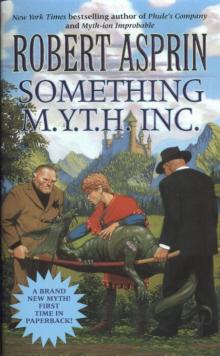 Something MYTH Inc
Something MYTH Inc Forbidden Land
Forbidden Land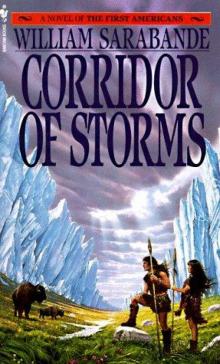 Corridor of Storms
Corridor of Storms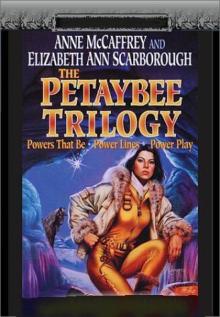 The Peytabee Omnibus
The Peytabee Omnibus Beyond the Sea of Ice
Beyond the Sea of Ice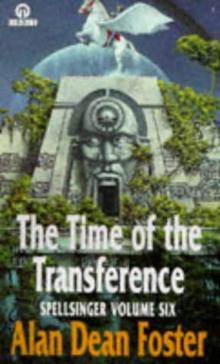 The Time Of The Transferance
The Time Of The Transferance EarthBlood
EarthBlood The Lexal Affair
The Lexal Affair The Web
The Web Slave Ship
Slave Ship Eternity Row
Eternity Row Planet Pirates Omnibus
Planet Pirates Omnibus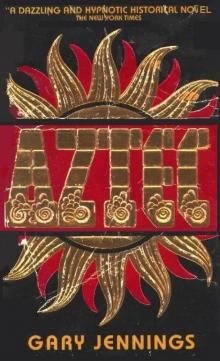 Aztec
Aztec The Awakening
The Awakening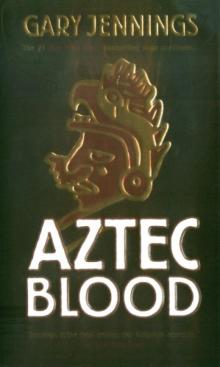 Aztec Blood
Aztec Blood The Mystery of Ireta Omnibus
The Mystery of Ireta Omnibus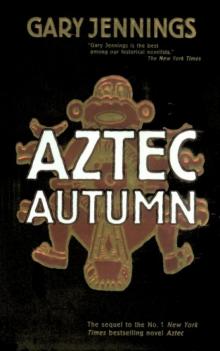 Aztec Autumn
Aztec Autumn The Savage Horde
The Savage Horde Anti - Man
Anti - Man Deep Trek
Deep Trek Starfall
Starfall The Paths Of The Perambulator
The Paths Of The Perambulator Fool's Fate
Fool's Fate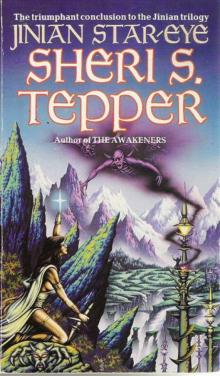 Jinian Stareye
Jinian Stareye Endurance
Endurance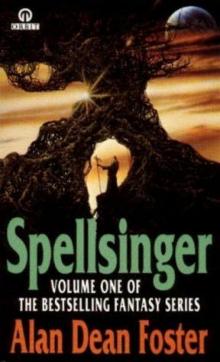 Spellsinger
Spellsinger Hybrids
Hybrids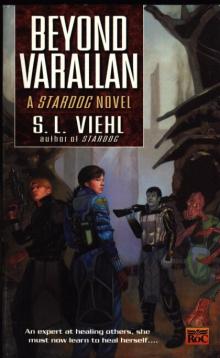 Beyond Varallan
Beyond Varallan Doona Trilogy Omnibus
Doona Trilogy Omnibus In th Balance
In th Balance Planerbound
Planerbound The Nightmare begins
The Nightmare begins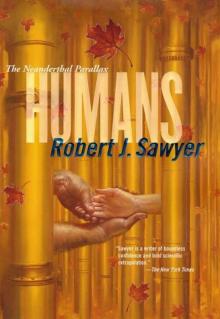 Humans
Humans Son Of Spellsinger
Son Of Spellsinger